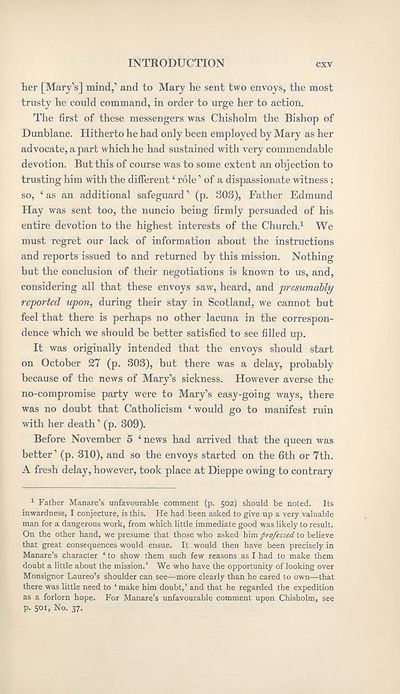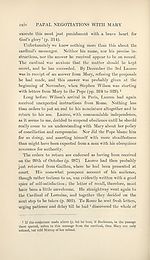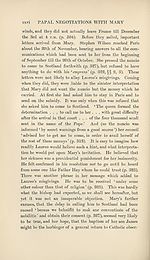Series 1 > Papal negotiations with Mary Queen of Scots during her reign in Scotland, 1561-1567
(120) Page cxv
Download files
Complete book:
Individual page:
Thumbnail gallery: Grid view | List view

INTRODUCTION
cxv
her [Mary’s] mind,’ and to Mary he sent two envoys, the most
trusty he could command, in order to urge her to action.
The first of these messengers was Chisholm the Bishop of
Dunblane. Hitherto he had only been employed by Mary as her
advocate, a part which he had sustained with very commendable
devotion. But this of course was to some extent an objection to
trusting him with the different ‘ role ’ of a dispassionate witness;
so, 4 as an additional safeguard ’ (p. 303), Father Edmund
Hay was sent too, the nuncio being firmly persuaded of his
entire devotion to the highest interests of the Church.1 We
must regret our lack of information about the instructions
and reports issued to and returned by this mission. Nothing
but the conclusion of their negotiations is known to us, and,
considering all that these envoys saw, heard, and presumably
reported upon, during their stay in Scotland, we cannot but
feel that there is perhaps no other lacuna in the correspon¬
dence which we should be better satisfied to see filled up.
It was originally intended that the envoys should start
on October 27 (p. 303), but there was a delay, probably
because of the news of Mary’s sickness. However averse the
no-compromise party were to Mary’s easy-going ways, there
was no doubt that Catholicism 4 would go to manifest ruin
with her death ’ (p. 309).
Before November 5 4 news had arrived that the queen was
better’ (p. 310), and so the envoys started on the 6th or 7th.
A fresh delay, however, took place at Dieppe owing to contrary
1 Father Manare’s unfavourable comment (p. 502) should be noted. Its
inwardness, I conjecture, is this. He had been asked to give up a very valuable
man for a dangerous work, from which little immediate good was likely to result.
On the other hand, we presume that those who asked him professed to believe
that great consequences would ensue. It would then have been precisely in
Manare’s character ‘ to show them such few reasons as I had to make them
doubt a little about the mission.’ We who have the opportunity of looking over
Monsignor Laureo’s shoulder can see—more clearly than he cared to own—that
there was little need to ‘make him doubt,’ and that he regarded the expedition
as a forlorn hope. For Manare’s unfavourable comment upon Chisholm, see
p. SOI, No. 37.
cxv
her [Mary’s] mind,’ and to Mary he sent two envoys, the most
trusty he could command, in order to urge her to action.
The first of these messengers was Chisholm the Bishop of
Dunblane. Hitherto he had only been employed by Mary as her
advocate, a part which he had sustained with very commendable
devotion. But this of course was to some extent an objection to
trusting him with the different ‘ role ’ of a dispassionate witness;
so, 4 as an additional safeguard ’ (p. 303), Father Edmund
Hay was sent too, the nuncio being firmly persuaded of his
entire devotion to the highest interests of the Church.1 We
must regret our lack of information about the instructions
and reports issued to and returned by this mission. Nothing
but the conclusion of their negotiations is known to us, and,
considering all that these envoys saw, heard, and presumably
reported upon, during their stay in Scotland, we cannot but
feel that there is perhaps no other lacuna in the correspon¬
dence which we should be better satisfied to see filled up.
It was originally intended that the envoys should start
on October 27 (p. 303), but there was a delay, probably
because of the news of Mary’s sickness. However averse the
no-compromise party were to Mary’s easy-going ways, there
was no doubt that Catholicism 4 would go to manifest ruin
with her death ’ (p. 309).
Before November 5 4 news had arrived that the queen was
better’ (p. 310), and so the envoys started on the 6th or 7th.
A fresh delay, however, took place at Dieppe owing to contrary
1 Father Manare’s unfavourable comment (p. 502) should be noted. Its
inwardness, I conjecture, is this. He had been asked to give up a very valuable
man for a dangerous work, from which little immediate good was likely to result.
On the other hand, we presume that those who asked him professed to believe
that great consequences would ensue. It would then have been precisely in
Manare’s character ‘ to show them such few reasons as I had to make them
doubt a little about the mission.’ We who have the opportunity of looking over
Monsignor Laureo’s shoulder can see—more clearly than he cared to own—that
there was little need to ‘make him doubt,’ and that he regarded the expedition
as a forlorn hope. For Manare’s unfavourable comment upon Chisholm, see
p. SOI, No. 37.
Set display mode to:
![]() Universal Viewer |
Universal Viewer | ![]() Mirador |
Large image | Transcription
Mirador |
Large image | Transcription
Images and transcriptions on this page, including medium image downloads, may be used under the Creative Commons Attribution 4.0 International Licence unless otherwise stated. ![]()
| Scottish History Society volumes > Series 1 > Papal negotiations with Mary Queen of Scots during her reign in Scotland, 1561-1567 > (120) Page cxv |
|---|
| Permanent URL | https://digital.nls.uk/126972573 |
|---|
| Attribution and copyright: |
|
|---|
| Description | Over 180 volumes, published by the Scottish History Society, containing original sources on Scotland's history and people. With a wide range of subjects, the books collectively cover all periods from the 12th to 20th centuries, and reflect changing trends in Scottish history. Sources are accompanied by scholarly interpretation, references and bibliographies. Volumes are usually published annually, and more digitised volumes will be added as they become available. |
|---|


